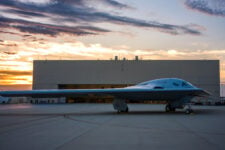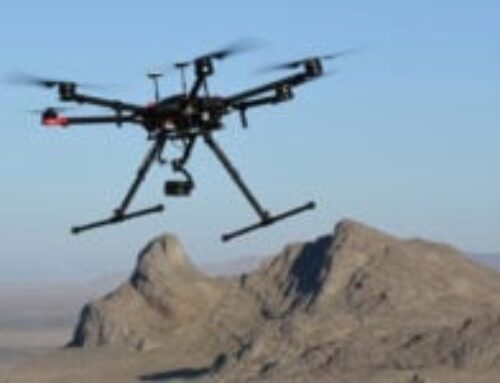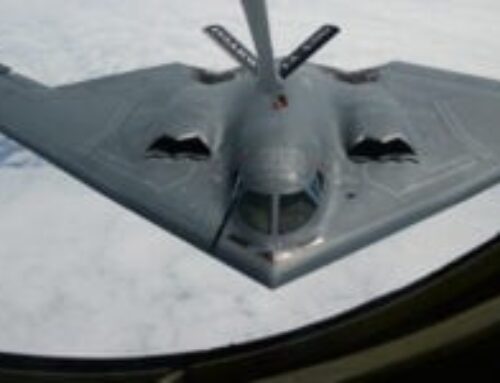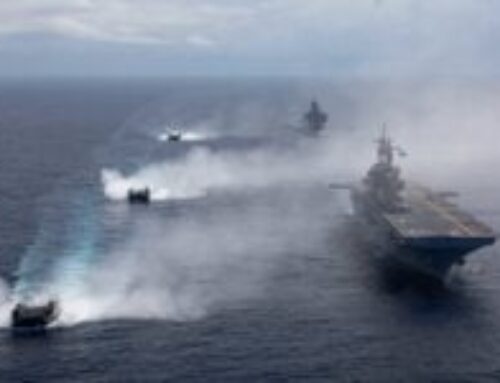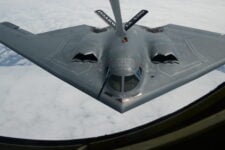The B-21 Raider, a new long-range stealth bomber developed by Northrop Grumman. (US Air Force photo.)
WASHINGTON — Whatever may come of China’s new long-range stealth bomber known as the Xi’an H-20, US officials are confident it won’t measure up to American designs, according to a DoD intelligence official.
“The thing with the H-20 is when you actually look at the system design, it’s probably nowhere near as good as US LO [low observable] platforms, particularly more advanced ones that we have coming down,” the official said, speaking on condition of anonymity in a briefing with reporters at the Pentagon today.
“They’ve run into a lot of engineering design challenges, in terms of how do you actually make that system capability function in a similar way to, like, a B-2 or a B-21,” the official added.
The H-20 is expected to be Beijing’s answer to American platforms such as the new B-21 Raider, though little is known about the Chinese program given intense state secrecy.
In March, a Chinese military official reportedly told state-owned newspaper Hong Kong Commercial Daily that the H-20 would be unveiled soon, though the timeline is not clear.
“You may choose to unveil it just because they want to show that they’re a great, you know, military power. That doesn’t necessarily mean it actually delivers them the kind of capability that they would need or at the quantity that they would need,” the DoD intelligence official said.
Asked whether the H-20 is a concern, the official replied “Not really.”
It’s not the first time a DoD official has verbally shrugged at a key part of China’s military aviation modernization plan. In September 2022, former Pacific Air Forces Commander Gen. Kenneth Wilsbach told reporters that the J-20 stealth fighter isn’t “anything to lose a lot of sleep over.” (The DoD intelligence official today said the J-20 is “still a highly capable system” but one that did not “meet all of [China’s] original parameters.”)
Preparing For A ‘Protracted’ Fight With US
While not billed as a China briefing, the DoD intelligence official’s comments today were almost exclusively focused on the military threat posed by Beijing, which Pentagon officials have dubbed America’s “pacing challenge.” China is serious about preparing all levels of society for a “protracted” conflict with the US, the official said, emphasizing that Beijing is purposefully equipping the People’s Liberation Army (PLA) to exploit American military weaknesses.
One key focus of China’s burgeoning military modernization is the expansion of its nuclear portfolio, with Beijing already amassing an operational arsenal of 500 nuclear warheads that officials warn [PDF] could surpass 1,000 by 2030. But there are doubts about some elements of the country’s actual military prowess given widespread corruption, which prompted outcomes like missiles filled with water instead of fuel and missile silos whose launch lids probably wouldn’t work, Bloomberg reported.
Asked about the Bloomberg report, the official said “some of them were probably filled with water or had door lids that didn’t open but not all of them” across China’s military force.
“The biggest, I guess, kind of challenge for the Chinese side is actually not so much capability of actual systems, it’s more capability of personnel to effectively employ those systems at speed and at scale,” the official said.
Notably, China’s Rocket Force has seen a number of leaders publicly expelled from their roles in recent months, a purge which included then-Defense Minister Li Shangfu, reportedly under “corruption” charges. Though rooting out corruption in years past may have been a front to more simply consolidate power, recent anti-corruption moves by Chinese President Xi Jinping “seem to actually be [targeting] instances of corruption,” according to the official.
Nevertheless, officials are still preparing for a scenario where the bulk of Beijing’s military might is highly effective. Although US officials have publicly emphasized that war with China is neither inevitable nor imminent, Xi and “the CCP [Chinese Communist Party] almost certainly does” think war is inevitable, the official said, adding that CCP leadership believes that the US would be the one to start the conflict.
Explaining the thinking of senior Pentagon leaders, the DoD intelligence official said “I don’t want to rely on the Chinese not being good [at combat], because we’re not going to know they’re not good until they’re shooting at us. And I don’t want to be in a position where I find out, ‘Oh, they actually are that good. That’s a problem.’”


